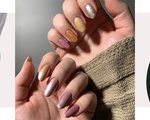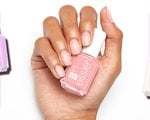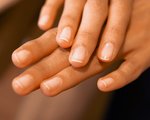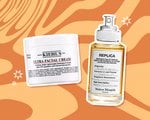How to Strengthen Your Nails, According to the Pros
June 12, 2023
What Causes Brittle Nails?
Weak nails come in a few different forms. “Your nails can be thin and soft or hard and brittle,” says Essie global lead educator and manicurist Rita Remark. “For nails, strength is defined by an ability to withstand pressure without folding over or breaking.” She explains that strong nails are defined by their density, not their thickness.
Weak nails can sometimes be a result of genetics, but that's not always the case, says Remark. “Weak nails can be the result of surface damage, like improper application or removal of gels and acrylics, age, poor health or strong medication.” That said, if your nails are typically sturdy, but weaken once they reach a certain length, the problem may actually be your nail bed, not the nail itself. “Some nail beds aren’t long enough to withstand extra length. You can have very strong and healthy nails, but short nail beds that prevent them from being able to grow long.”
The most common cause of brittle nails is a lack of hydration, “both internally and externally,” says editorial manicurist and brand founder Jin Soon Choi. “Even natural causes like age can factor into the health of your nails.”
What Do Strong, Healthy Nails Look Like?
Not sure if your nails are in their best state? According to Choi, healthy nails grow quickly, have cuticles that are not discolored, have a smooth surface with no ridges and are the same thickness and color. They also won’t appear dry or in need of moisture (although moisture will help your nails get to and maintain a healthy stage).
How to Strengthen Brittle Nails
Tip #1: File Your Nails Properly
Depending on the strength of your nail, keeping them short is likely your best bet. We also recommend filing your nails in one direction rather than quick, back-and-forth motions. If you opt to let your nails grow longer, Remark recommends mimicking the natural shape of your cuticle when filing the tip of your nails. “This keeps the nail balanced, so the pressure and weight is evenly distributed across the surface of the nail and it’s less likely to chip or break.”
Tip #2: Use Strengthening Polish
Letting your nails breathe from acrylics or gels can prevent dehydration, but giving your nails a break won’t strengthen them if you don’t use a treatment at the same time. We recommend the Essie Hard to Resist Advanced Nail Strengthener, a clear strengthening treatment that offers nourishment and shine to your natural nails. The formula promises visibly healthier nails in just three days.
We also love the original Essie Hard to Resist Nail Strengthener Treatment, which comes in two translucent shades of baby pink and violet for a subtle hint of color.

Tip #3: Use a Strengthening Base Coat
If you can’t part with your favorite polish color, just make sure to use a strengthening base coat, like the Essie Strong Start Base Coat. “Base coasts are the first nail-care step of every manicure, so choose one to suit your natural nail needs.” Not only will this help strengthen your nail, it will also prevent the nail polish from staining your nail.

Tip #3: Don’t Pick or Pull Your Polish
We know it can be tempting to pick off your polish (guilty!), but do your best to resist temptation — especially when it comes to gel polishes. “Picking off your gel polish, or even regular nail polish, can dent or strip your natural nails,” says Remark. Instead, use nail polish remover and a cotton ball to soak off your polish.
Tip #4: Hydrate Your Nails
The most important thing you can do to strengthen your nails is apply cuticle oil every day to hydrate and moisturize your nails. Remark explains that having weak nails should be treated similarly to having weak hair. “If you over bleach or damage your hair with heat styling, you wouldn’t forgo using product — you’d utilize a mask, a moisturizing treatment or a deep conditioner to help regain your hair’s strength,” she says. “Our nails and our hair are made of the same proteins, so if your nails are weak, use cuticle oil, use a strengthening treatment and choose a hydrating base coat.”
Tip #5: Adopt a Consistent Nail-Care Routine
“A consistent nail-care regimen is the best way to keep nails strong and healthy,” says Choi. She recommends applying a strengthening treatment or base coat to natural nails, even if you’re not applying polish on top. “Nail strengtheners like JINsoon HyperRepair help restore nails to a healthy, hydrated, strong and nourished state,” she says. “They contain ingredients that promote nail growth and health while preventing brittleness and breakage.”
You should also apply cuticle oil every day to keep your cuticles and nail beds moisturized. We love the Essie On a Roll Apricot Cuticle Oil, which has a fast-absorbing formula and an easy, on-the-go format for mess-free reapplication. Remember, consistency is key when it comes to trying to repair weak, brittle nails.

Tip #6: Limit Your Exposure to Acetone
Choi recommends limiting your exposure to “acetone and other chemicals like gels, powders, acrylics and house cleaning chemical products.” “These chemicals can weaken and damage your nails over time,” she explains, leading to a fragile and brittle appearance. Consider wearing rubber gloves when cleaning your house or doing the dishes.
Tip #7: Prioritize Safe Nail Enhancement Application and Removal
As great as it feels to get a fresh set of acrylics or a new gel manicure, improper application and removal of these nail enhancements can wreak havoc on your natural nails. “If your nails are removed with anything except a file or an acetone-based solvent, like dental floss, a credit card or another nail tip, run!” celebrity nail artist Julie Kandalec previously told Makeup.com. “Your nails will suffer major damage that will take weeks or months to grow out.”
The same goes for removing press-on nails — this guide will teach you how to take the enhancements off without causing harm to your natural nails.
Tip #8: Don’t Overdo Alcohol-Based Hand Sanitizers
Alcohol-based hand sanitizers do a great job at killing germs and keeping your hands clean on-the-go, but as Dr. Dana Stern, a board-certified dermatologist and founder of nail-care brand Dr. Dana, previously told Makeup.com, they can also dry out the skin around your nails. Try not to over-apply hand sanitizer, and look for formulas that contain hydrating ingredients alongside the alcohol, like the aloe vera-infused sanitizers from Touchland.

Tip #9: Review Your Water and Nutrient Intake
“I also recommend plenty of hydration and consistent nutrient intake to help the nails from the inside out,” says Choi. Plus, not only will getting enough water and nutrients help strengthen your nails, it will also help keep your skin and hair hydrated. Talk to your doctor before making any changes to your diet and to find out which nutrients your body might be lacking.
Tip #10: Limit Hot Water Exposure
Hot water can dry out your nails and cuticles and also make your nail enhancements more likely to lift. To limit your hot water exposure, make sure to always wear gloves when you’re washing dishes and stick to lukewarm water while you’re in the shower.
Tip #11: Apply Hand Cream
In addition to cuticle oil and strengthening treatments, hand creams can help keep your hands and nail beds soft and moisturized. We love applying the La Roche-Posay Cicaplast Hand Cream, which is packed with shea butter, glycerin and niacinamide for soft, smooth skin.

Tip #12: Let Your Nails Go Natural
While nails cannot “breathe,” Choi says it’s still important to let them be in their natural state from time to time. “Nails also grow brittle from constantly wearing acrylics, gel or even regular nail polish, undermining the strength and health of the nail,” she says.
































